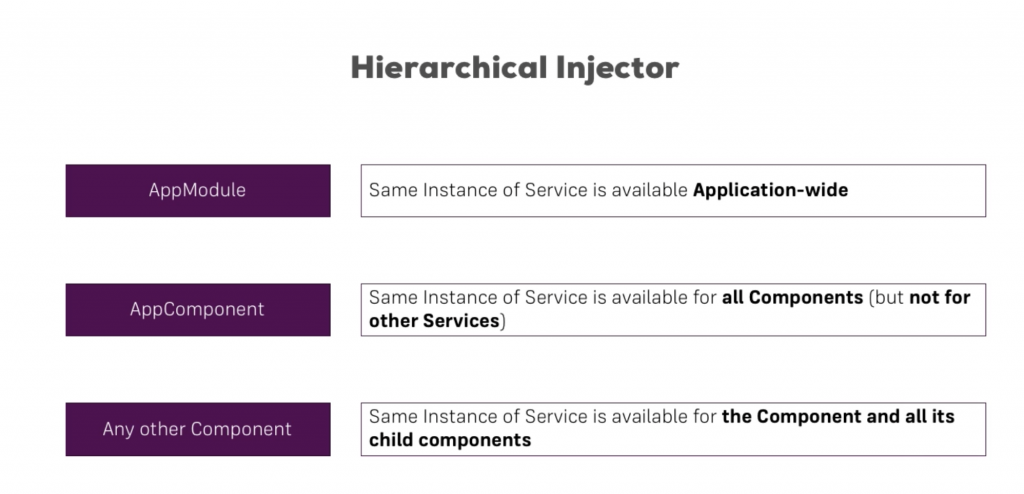Injecting a custom service into components
- A Service is created when we need a centralized component which serves some functionality to multiple components. Also we would expect to be a singleton instance.
app.component.html
<button type="button" (click)="testLoggingService('one')" name="button">Test Logging Service One</button>
<button type="button" (click)="testLoggingService('two')" name="button">Test Logging Service Two</button>
app.component.ts
import { Component } from '@angular/core';
import { LoggingService } from './logging.service';
@Component({
selector: 'app-root',
templateUrl: './app.component.html',
styleUrls: ['./app.component.css'],
providers: [LoggingService]
})
export class AppComponent {
myCondition = true;
value=10;
constructor(private LoggingService: LoggingService){}
testLoggingService(msg) {
this.LoggingService.logStatusChange(msg);
}
}
logging.service.ts
export class LoggingService {
logStatusChange(status: string) {
console.log('A server JAJAJA JIJIJIJ JOJOJOJ' + status);
}
}
Angular has a Hierarchical Injector for dependencies:
WARNING: If we declare in [providers] a service in a child component which is declared in the parent component, we are overwritting the parent one , so they are two different instances.
For using a service declared in the parent component we still need to define it as a parameter in the constructor but we don’t need to declare it in the [providers] decorator.
The highest level to declare a dependency is in the AppModule.
Injecting Services into Services
- We inject both services into AppModule.
app.module.ts
import { BrowserModule } from '@angular/platform-browser';
import { NgModule } from '@angular/core';
import { FormsModule } from '@angular/forms';
import { HttpModule } from '@angular/http';
import { AppComponent } from './app.component';
import { BasicHighlightDirective } from './basic-highlight.directive';
import { BetterHighlightDirective } from './better-highlight.directive';
import { UnlessDirective } from './unless.directive';
import { AccountsService } from './accounts.service';
import { LoggingService } from './logging.service';
@NgModule({
declarations: [
AppComponent,
BasicHighlightDirective,
BetterHighlightDirective,
UnlessDirective
],
imports: [
BrowserModule,
FormsModule,
HttpModule
],
providers: [AccountsService, LoggingService],
bootstrap: [AppComponent]
})
export class AppModule { }
app.component.html
<button type="button" (click)="addAccount()" name="button">Add Account</button>
<button type="button" (click)="removeAccount()" name="button">Remove Account</button>
<ul>
<li *ngFor="let account of accounts">Account #{{account.id}}</li>
</ul>
app.component.ts
import { Component } from '@angular/core';
import { AccountsService } from './accounts.service';
@Component({
selector: 'app-root',
templateUrl: './app.component.html',
styleUrls: ['./app.component.css'],
})
export class AppComponent {
myCondition = true;
value=10;
accounts = this.AccountsService.accounts;
constructor(private AccountsService: AccountsService){}
addAccount() {
this.AccountsService.addAccount();
}
removeAccount() {
this.AccountsService.removeAccount();
}
}
accounts.service.ts
import { Injectable } from '@angular/core';
import { LoggingService } from './logging.service';
@Injectable()
export class AccountsService {
accounts = [];
constructor(private logginService: LoggingService){}
addAccount() {
const newId = this.accounts.length;
this.accounts.push({
date: new Date().getTime(),
id: newId
});
this.logginService.log('Account #' + newId + ' added!');
}
removeAccount() {
this.accounts.splice(this.accounts.length-1,1);
this.logginService.log('Account removed!');
}
}
Cross Components Communication using services
accounts.service.ts
... sendMessage = new EventEmitter<string>(); ...
component-one.component.ts
...
constructor(private accountsService: AccountsService) { }
...
emitEvent() {
this.accountsService.sendMessage.emit('Hola caracola!!');
}
component-one.component.html
<p> <button type="button" (click)="emitEvent()" name="button">Component One emits event to Component Two</button> </p>
component-two.component.ts
import { Component, OnInit } from '@angular/core';
import { AccountsService } from '../accounts.service';
@Component({
selector: 'app-component-two',
templateUrl: './component-two.component.html',
styleUrls: ['./component-two.component.css']
})
export class ComponentTwoComponent implements OnInit {
receivedMsg:string = 'No message received yet';
constructor(private accountsService: AccountsService) {
this.accountsService.sendMessage.subscribe(
(message: string) => {
this.receivedMsg = message;
}
);
}
ngOnInit() {
}
}
component-two.component.html
<p>
Component Two receives event --> Message:{{receivedMsg}}
</p>
ds
dsd
sd
sd
sd
sd
sds
f


